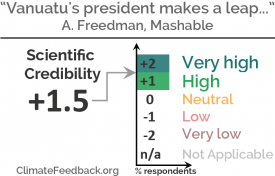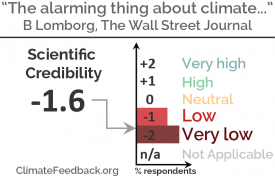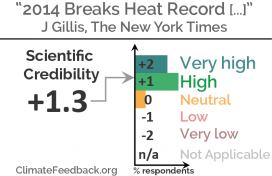Article Reviews
“Is this article consistent with the latest thinking and knowledge in science?”
“Would experts in this field endorse the main message of this article?”
These are the types of questions our “feedbacks” are designed to answer. If the feedback is positive, you can generally assume the information you’re reading is of high credibility. If it’s negative, however, you may want to read with extra care and attention — some of the information contained and conclusions reached are not consistent with science.[1]
Analysis of “Vanuatu’s president makes a leap in tying Cyclone Pam to climate change”
in Mashable, by Andrew Freedman
"... well-written article that hits most of the key points regarding the complex question of how global warming may affect tropical cyclones."
— 23 Mar 2015
Analysis of “The Alarming Thing About Climate Alarmism”
in The Wall Street Journal, by Bjorn Lomborg
"Tries and fails to make a convincing case for why humans need to worry about climate change less than they currently do."
— 10 Feb 2015
Analysis of “2014 Breaks Heat Record, Challenging Global Warming Skeptics”
in The New York Times, by Justin Gillis
"This article does a good job of putting the 2014 temperature record in context with quotes from experts and good descriptions of relevant issues such as El Nino."
— 29 Jan 2015
[1] Note: These feedbacks do not constitute endorsements of the author’s political or economic ideology, rather they are assessments of the scientific foundations and reasoning of the argumentation contained within each article.



